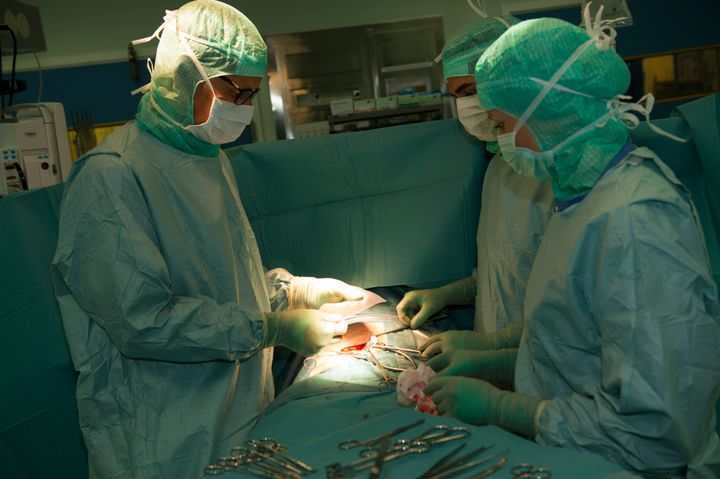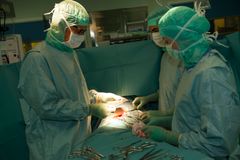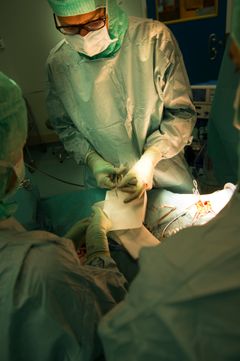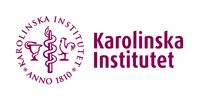Mosquito net safe to use in inguinal hernia repair
Sterilised mosquito nets can replace costly surgical meshes in the repair of inguinal (groin) hernias without further risk to the patients. This makes mosquito nets a good alternative for close to 200 million people in low-income countries suffering from untreated groin hernias. These are the results of a Swedish-Ugandan study presented in the prestigious New England Journal of Medicine (NEJM).

An inguinal hernia is a defect or a hole in the abdominal wall around the groin, through which fat, intestines and sometimes other abdominal organs can be pressed into a sack-like protrusion. It is a common complaint in both high and low-income countries, and the only effective treatment is surgery. Without surgery, inguinal hernias can cause considerable suffering and life-threatening complications that cause some 40,000 fatalities a year.
Hernia surgery is also one of the world's most common surgical procedures, accounting for around 20 million operations every year. However, almost 200 million sufferers do not receive surgery, most of who live in the poorer parts of the world; the operations that are performed use techniques that are clearly inferior to those used in high-income countries. One of the reasons that too few people in low-income countries are given the chance of effective treatment is that the scientifically tested meshes available on the market are very expensive. ”Commercial hernia meshes cost 100 dollars or more, which is too much for the health services and people living in poor countries,” says Dr Jenny Löfgren, researcher at Umeå University's Department of Surgical and Perioperative Sciences. ”So instead, doctors and surgeons in several countries have been using mosquito nets, but whether they are effective and safe hasn't been given sufficient study until now.” Working with colleagues from, amongst other institutions, Karolinska Institutet in Sweden and Uganda's Makerere University, Dr Löfgren has therefore conducted a large randomised clinical trial to compare mosquito net with the regular commercial mesh used in hernia operations. The study, which is published in NEJM, involved over 300 adult males from rural eastern Uganda who were randomly assigned to receive the one or the other type of reinforcement. The operations were performed by four experienced surgeons at the Kamuli Mission Hospital, and the participants were subsequently monitored for a year as regards patient satisfaction, post-operative complications or recurrence. The results show that the post-operative complications that occurred were normally mild and that there was no significant differences between the groups. This was also true of self-rated satisfaction. Only one patient in the mosquito-net group had a recurrence. All in all, the study shows, according to the team, that sterilised mosquito net is fine for use in hernia surgery without compromising patient safety and treatment efficacy. ”These results are of great potential benefit to the many millions of people who lack access to good surgical care for their hernias,” says study project leader and surgeon Dr Andreas Wladis, associate professor at Karolinska Institutet's Department of Clinical Science and Education at Stockholm South General (Söder) Hospital. ”The next step will be to motivate greater resource allocation to treat hernia patients and plan for how mosquito nets could be used for hernia surgery on a larger scale.” The study is part of Dr Jenny Löfgren's doctoral thesis, which she recently defended at Umeå University. It was funded by grants from several bodies, including the Swedish Society of Medicine, the Swedish Research Council, Swedish Rotary, the Church of Sweden and the Capio Research Foundation. Swedish hospitals and companies also contributed either donated or discounted equipment. Publication: 'A randomized trial of low cost mesh in groin hernia repair', Jenny Löfgren, Pär Nordin, Charles Ibingira, Alphonsus Matovu, Edward Galiwango, Andreas Wladis, NEJMx 14 January 2016, doi: 10.1056/NEJMoa1505126.
Contacts
For further information, please contact:
Jenny Löfgren, MD, PhD
Tel: +46 (0)70-4612426
E-mail: jenny.loefgren@gmail.com
Andreas Wladis, MD, PhD, Associate Professor
Tel: +46 (0)70-0017539
(http://tel:070-0017539)E-mail: andreas.wladis@ki.se
Download images and contact the Press Office at Karolinska Institutet (http://ki.se/pressroom)
Images




Subscribe to releases from Karolinska Institutet - English
Subscribe to all the latest releases from Karolinska Institutet - English by registering your e-mail address below. You can unsubscribe at any time.
Latest releases from Karolinska Institutet - English
Fluoride in drinking water is associated with impaired childhood cognition7.3.2025 15:30:00 CET | Pressmeddelande
Elevated concentrations of fluoride can occur in well water, and in some countries, it is added to drinking water to counteract caries in the population. A study from Karolinska Institutet in Sweden now supports a few previous studies indicating that exposure to fluoride during the fetal stage or early childhood may impair cognition in children. The study is published in the journal Environmental Health Perspectives.
Children with ARFID face increased risk of disease17.2.2025 17:00:00 CET | Pressmeddelande
Children with avoidant restrictive food intake disorder (ARFID) have an elevated risk of developing psychiatric and physical conditions, a new study from Karolinska Institutet published in JAMA Pediatrics reports. The study highlights the importance of early identification to improve care of these children.
Preterm babies receive insufficient pain management27.1.2025 15:29:17 CET | Pressmeddelande
A large proportion of babies born very early need intensive care, which can be painful. But the healthcare system fails to provide pain relief to the full extent. This is shown by the largest survey to date of pain in neonatal care, now published in the journal Pain.
New study paves way for immunotherapies tailored for childhood cancers20.1.2025 17:00:00 CET | Pressmeddelande
Researchers at Karolinska Institutet and the Astrid Lindgren Children’s Hospital in Sweden have determined how children’s immune systems react to different kinds of cancer depending on their age. The study, which is published in the journal Cell, reveals significant differences between the immune response of children and adults, and has the potential to lead to new tailored treatments for children with cancer.
AI can improve ovarian cancer diagnoses2.1.2025 11:00:00 CET | Pressmeddelande
A new international study led by researchers at Karolinska Institutet in Sweden shows that AI-based models can outperform human experts at identifying ovarian cancer in ultrasound images. The study is published in Nature Medicine.
In our pressroom you can read all our latest releases, find our press contacts, images, documents and other relevant information about us.
Visit our pressroom